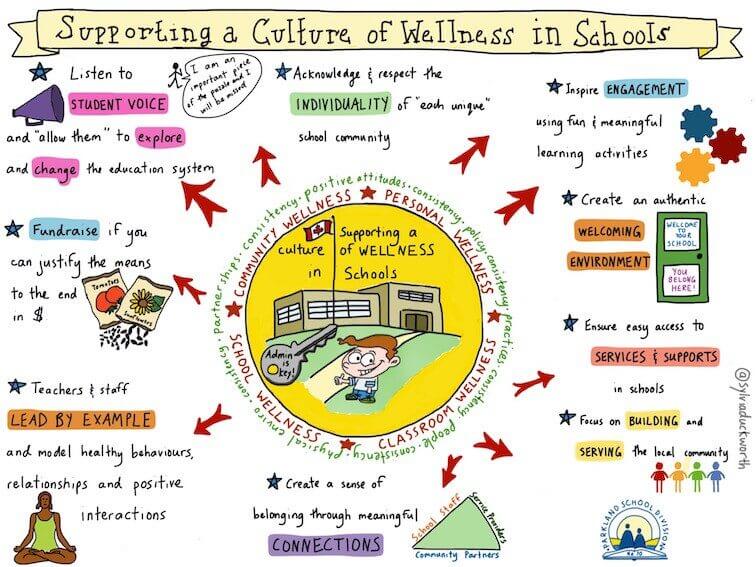
How Can You Support A Culture Of Wellness In Your School?
by TeachThought Staff
How can you create a culture of wellness in your school or classroom?
General ‘wellness’ is an important concept for leading a healthy life wrapped up in a generic term. What does wellness look like and how can you encourage it in a class setting? Sketch-noter Sylvia Duckworth created the graphic above to share tips for supporting a culture of well-being in schools.
Children spend a significant amount of each week day in a classroom, making it not only a place to learn academics but also an opportunity to teach life skills that will serve them beyond the schoolyard, like self-care, community involvement, and fostering a sense of connection and belonging.
9 Ways To Support A Culture Of Wellness In Your School
1. Listen to student voice and ‘allow them’ to explore and change the education system
Give students the opportunity to speak up and feel heard by encouraging them to give feedback and provide alternatives to school, new learning forms, or even reasons to go to school.
2. Consider activism and fundraising
Fundraising for a local cause is an important lesson in community activism and can lead to a sense of interdependence and purpose in students. You can also come up with ideas for project-based learning–or even ways to help students come up with their own ideas for projects!
3. Teachers and staff lead by example and model healthy behaviors, relationships, and positive interactions
Be the change you want to see in the world — and start locally. Students should see adults modeling integrity, accountability, and positive communication.
4. Acknowledge and respect the individuality of each unique school community
Every community is different and those differences must be understood and honored in order to feel a sense of peace and belonging — both in the world and at school.
5. Inspire engagement using fun and meaningful learning activities
While they matter and are deeply embedded in our profession, teaching isn’t simply about state standards and assessments. Crafting lessons using strategies that promote curiosity and a true desire to seek knowledge to create a mental environment for a lifelong love of learning.
6. Create a welcoming environment
Everyone just wants to feel like they belong. Greet students at the door by name or with a handshake. Make sure your students know they are seen, heard, and valued as individuals.
7. Ensure easy access to services and support in schools
Services may be offered, but do students know what that entails and who or how to ask? Outline the help available before help is necessary so they know where to turn.
8. Focus on building and serving the local community
Contributing to something greater can lead to feeling purposeful and a change of perspective about the circumstances of others. Get involved in community learning projects to model compassion on a grander scale.
See also 4 Education Strategies for Sustained Community Improvement
9. Create a sense of belonging through meaningful connections
Help create an environment of engagement and curiosity about others to encourage the development of deeper social relationships.
Wellness is really the lifelong practice of positivity — adopting a positive attitude, enacting positive policies and practices, surrounding yourself with positive people and places, and forming positive partnerships — and it’s never too early (or late!) to start.
9 Ways To Support A Culture Of Wellness In Your School
